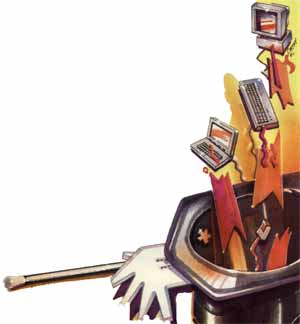
BY FRANK COHEN
We made a very, very costly mistake," said Sam Tramiel, president of Atari Corp., when asked about Atari's purchase and eventual dumping of the Federated Group retail chain. "We are computer/consumer electronics people, not retailers. In the future, we will stay in our field only."
Tramiel's words fell on a receptive audience of Atari enthusiasts at a recent news conference on GEnie, the modem information service. Questions ranged from TOS 1.4 operating system availability to technical specifications for new Atari equipment. Missing from the news conference, however, was mention of recent events confounding Atari Corp.'s efforts to rebound from a slow year of ST sales. Late last year, Tramiel announced an end to the DRAM memory chip crisis, which was blamed for shortages of ST machinery at U.S. computer dealers. In the wake of that shortage, new production quotas and sales employees were devoted to building a healthier U.S. dealer channel and reviving the enthusiasm that had slipped away.
With many supply problems resolved, the beginning of 1989 saw a resurgence of optimism. But the year couldn't be finished without some serious setbacks for Trammel. The American sales and marketing team of Mike Dendo (vice president, sales) and Joe Mendolia (vice president, marketing) walked off their jobs just three weeks prior to the news conference. Insiders report infighting between Dendo and other Atari executives. Lacking a sales and marketing group, how does Tramiel expect to make good on his vision of building a strong American base for Atari? Tramiel's news conference comments were short and abbreviated when discussing the Federated Group mistake. Not discussed was Trammel's recent loss of a court case against the former top officials at Federated Group. In August, Atari Corp. was ordered to pay severance and benefits totaling about $600,000 to former Federated President Kieth Powell and former Vice President Merrill Lyons. But Atari maintains that it was duped into buying an overvalued company by Federated officials. "[The Federated] only really cost us $100 million, but we cannot look backward, only learn from the mistake and not do it again," said Tramiel. One might wonder what the American ST market would be like if the same money was pushed into advertising, marketing and product development.
With the new decade rushing up to meet us, the eyes and ears of Atariland are waiting for Tramiel to pull a white rabbit out of his hat. Tramiel has promised new equipment, dealer promotions, hardware and software improvements and overhauled marketing to make 1989 the year of the Atari resurgence. The sheer variety of Trammel's pledges makes one wonder if any of his ideas will materialize.
